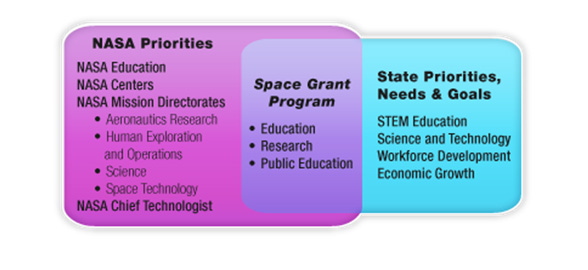| What GSGC Does |
About the National Space Grant College and Fellowship ProgramNASA initiated the National Space Grant College and Fellowship Program , also known as Space Grant, in 1989. Space Grant is a national network of colleges and universities. These institutions are working to expand opportunities for Americans to understand and participate in NASA's aeronautics and space projects by supporting and enhancing science and engineering education, research and public outreach efforts. The Space Grant national network includes over 850 affiliates from universities, colleges, industry, museums, science centers, and state and local agencies. These affiliates belong to one of 52 consortia in all 50 states, the District of Columbia and the Commonwealth of Puerto Rico.
The 52 consortia fund fellowships and scholarships for students pursuing careers in science, mathematics, engineering and technology, or STEM, as well as curriculum enhancement and faculty development. Member colleges and universities also administer pre-college and public service education projects in their states.
A quarter century of NASA (National Aeronautics and Space Administration) in Georgia!It has been over 25 years since Georgia was chosen as one of the original 17 states to manage a National Space Grant College and Fellowship Program sponsored by NASA. The initial program was enacted by Congress in 1989 as a brain child of the late Senator Lloyd Bentsen. The Georgia program started in 1990 with Georgia Tech as the lead institution and four other colleges and universities in the State were affiliate members. Since 1990, the consortium has grown to include 17colleges, two non-profit organizations, and two industrial affiliates. The Georgia Space Grant Consortium (GSGC) has reached hundreds of thousands in the past quarter century years through its innovative programs for all residents. The GSGC is a NASA presence in the State with unparalleled impact, which is officially quantified each year to report to congress. The collaborations between affiliates to provide programming to reach Georgia residents, as well as the collaboration of the GSGC with other organizations with similar or overlapping goals to maximize impact and cost effectiveness is another part of the great success of the program. | >
The Georgia Space Consortium has programs in five key areas* K-12STEM education - Enhancing teacher training, and direct student programs * Working with Informal Education Providers (Science Centers, museums, after school programs, etc.) * Higher Education - Providing internships and authentic technical experiences for College students * Faculty Research - Developing or collaborating on cutting edge scientific and engineering research with private industry, academic institutions, the military, and other government agencies * Fellowships - providing funding for students to pursue degrees in STEM |
